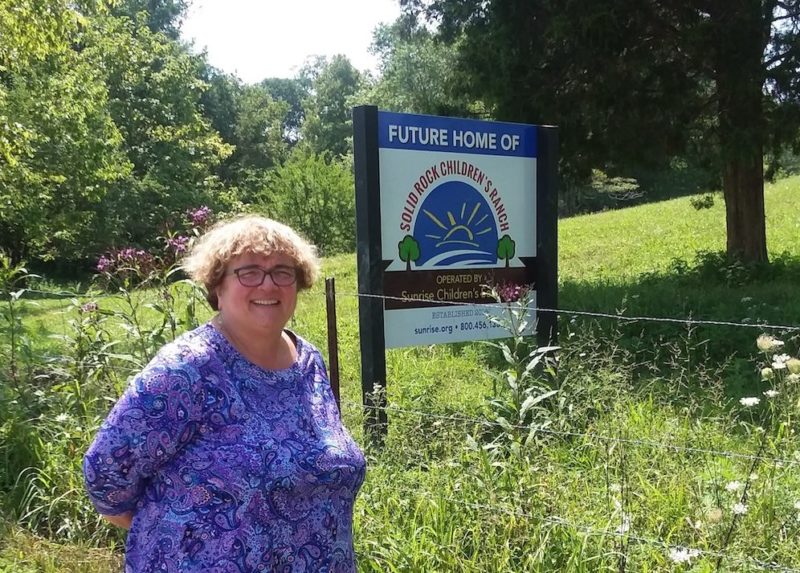 Judy Singleton (Photo by Lashana Harney)
Judy Singleton (Photo by Lashana Harney)
Judy Singleton remembers running up and down the hills on her Kentucky farm as a child. “I used to love to do that as a kid!” Hers was a childhood full of farm activity and animals—a pet lamb, a pet cow, a pet pony, pet dogs, cats, chickens…
But these days, the retired kindergarten teacher isn’t looking back. She’s looking forward to the farm’s future, when it will be transformed into Solid Rock Children’s Ranch, a foster-care home where siblings in foster care can stay together. Last year, Singleton donated her 130-acre Winchester, Ky., family farm to Sunrise Children’s Services, a 150-year-old, non-profit, faith-based organization dedicated to caring for Kentucky’s abused and neglected children, which will use the land to construct two five-bedroom foster homes.
“This was a vision that God placed in my heart,” says Singleton. In her 35-year career as a full-time teacher, plus recent years as a part-time Response to Intervention (RTI) teacher, Singleton has seen an increasing number of children in crisis, who live with grandparents or with parents who can’t capably care for them.
“As I worked with the kids, I began to see all these problems, and God placed in my heart that I could do more.
“I’ve still got some good years ahead of me, and I want to help these kids,” says Singleton, 65, who will continue to live on the farm during her lifetime. As a certified respite caregiver, Singleton can welcome the children into her home, and do crafts, cooking, Bible study, and other after-school activities with them. “I want my home to be a place where they can come and just talk, and know it’s going to be okay. Whatever they need, I want to be that for them.”
With the number of children in foster care rising across the nation, her gift couldn’t come at a better time, notes Melissa Bailey, director of marketing for Sunrise Children’s Services. “When folks like Judy, and other donors, supporters and prayer warriors, find us and contact us, it’s so important to our ministry.
“There are more and more children to help.”
An Epidemic of Need
As opioid addiction has soared across the nation, the need for foster care also has climbed. In 2016, the number of U.S. children in foster care rose for the fourth year in a row, according to a U.S. Department of Health and Human Services report. By the end of 2016, they numbered about 437,500. For more than a third of those children, a parent’s drug abuse was a factor.
Making matters worse, at least half of U.S. states have seen their foster-care capacity decrease since 2012, according to a Chronicle of Social Change report. Either these states have fewer beds and more youth in foster care, or any increase in beds has been dwarfed by the skyrocketing number of children who don’t have parents who can care for them.
Kentucky is no exception. The state’s painkiller and heroin epidemic parallels a 23 percent jump, between 2012 and 2017, in the number of children in foster care. State officials say 71 percent of those children came into foster care as a result of drug abuse.
“Kentucky certainly does have an epidemic on its hand,” says Bailey. “This year, we’re approaching 10,000 kids in state care. We’re at crisis level. So the work that Sunrise Children’s Services does, and other state agencies, is vital.”
Singleton knows these children—and she knows how important it is for them to stay together. “One time, I had this little boy in kindergarten who was actually taking care of his younger siblings! There were three little boys, like stair steps. And when he got to first grade, it was his job to get the kindergartner to school. Eventually they went to live with their grandparents, but it was heartbreaking to see his burden at 5 or 6 years old.”
More recently, as a part-time RTI educator who works specifically with children with challenges, Singleton has found that most of her students are living with grandparents or “in home situations that they should not be in,” she says. “A few years ago, I had a family of five—four girls, one boy—I was working with the boy the year they were removed from the home, and I was very concerned that they would be separated but they were actually placed with an older lady together.”
Sibling Power
Studies show that siblings placed together in foster care are less likely to run away, less likely to have behavioral issues, and more likely to succeed academically. They feel safer and more supported. And federal law does require states to make a reasonable effort to keep siblings together, unless there are safety reasons not to do so.
“It’s traumatic enough that they’ve been removed from their biological home and parents,” says Bailey. “Breaking them up is really detrimental to their healing.”
But keeping siblings together isn’t easy. Not many foster homes can accommodate more than one or two children, notes Bailey. “In an ideal situation, we’d have siblings working together, healing together, under one roof. But when you have a sibling group of four, five, six kids, which we see from time to time, we don’t often have one roof for them to go under together.”
Sunrise and Singleton’s vision for the Solid Rock Children’s Ranch calls for the construction of two, five-bedroom cabins where siblings can stay and heal together. The first phase will establish the necessary infrastructure—a new access road, plus water, septic and electric systems—and the first of the two cabins, and cost about $500,000.
So far, Sunrise has raised about $20,000. “We’ve got a little ways to get there,” says Bailey, “but we’re confident the Lord will provide and our friends and supporters will gather.”
“I know God didn’t bring me this far for it not to be finished and completed.”






